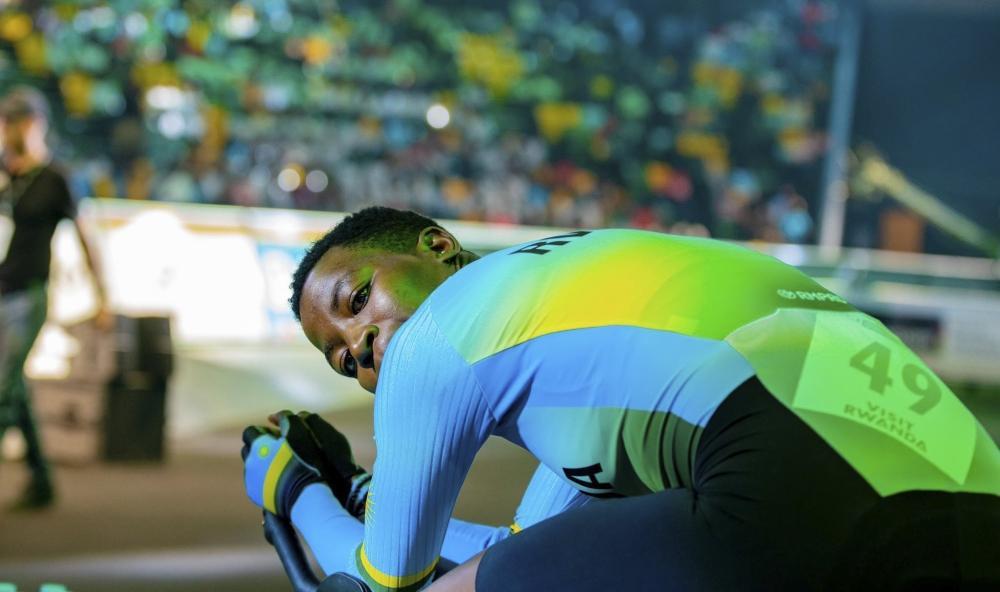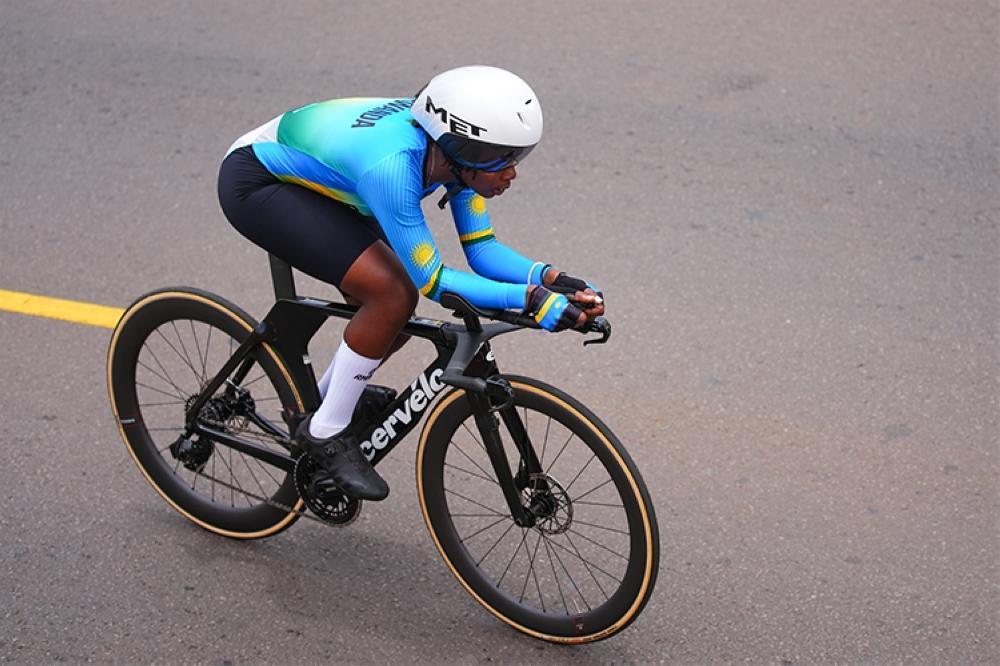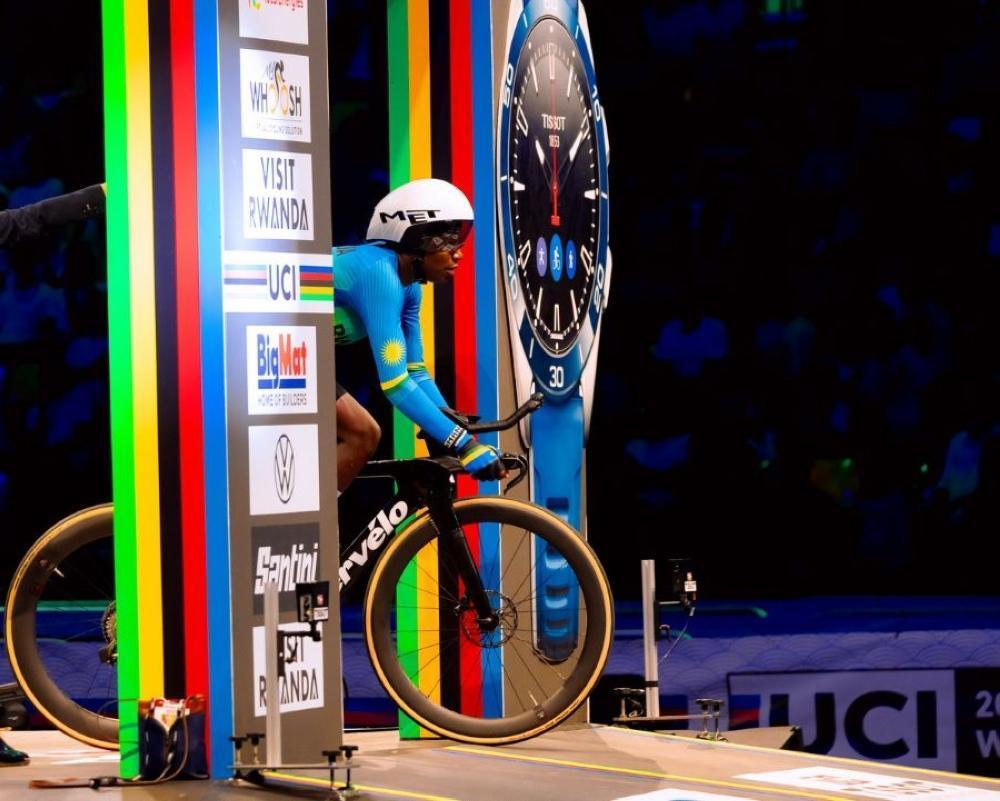Africa-Press – Rwanda. When Martha Ntakirutimana first took an interest in cycling, it was far from common to see women on bikes in Rwanda. As a young woman stepping into a male-dominated sport, she was met with skepticism and criticism.
Strangers told her “Girls don’t ride bikes” and warned she would never get anywhere.
But Ntakirutimana refused to be discouraged. She kept riding, stayed focused, and let her performance speak louder than the doubters.
Now 22, the professional cyclist from Kabuga in Gasabo District has been competing for three years. On September 22, she proudly represented Rwanda in the Women’s U23 Individual Time Trial at the 2025 UCI Road World Championships in Kigali.
Martha Ntakirutimana, 22, the professional cyclist from Kabuga in Gasabo District has been competing for three years.
Though she finished 27th out of 30 riders, crossing the line 5 minutes and 31 seconds behind the winner, competing in her country was a milestone moment for both her and the budding community of Rwandan women in cycling.
“I wasn’t among the winners, but I gave it my best,” she said.
Ntakirutimana trains daily with the Ndabaga Women Cycling Team, focusing on endurance, speed, and strategy. Her cycling journey began in 2020 as a junior, and after a brief pause to pursue her education, she returned in 2023 with even more drive.
The main source of her strength is her family, especially her brother. She explained that she grew up with love.
More Rwandan women are gradually getting involved in cycling, but the journey hasn’t been easy. Like Ntakirutimana, many have faced challenges, from limited support to social attitudes that discourage them from taking part in the sport.
How female cycling has changed over time
Florent Nsengumuremyi, founder and head coach of Twin Lakes Cycling Academy (TLCA), and assistant coach at the UCI Solidarity Program for Kigali 2025, has been working to create space for more women in cycling by supporting young riders and helping them grow in the sport.
Having worked with athletes at different levels, Nsengumuremyi has seen progress in how cycling is perceived, especially where it was once considered a sport only for men.
“Our culture used to believe that anything physically demanding was meant for men. Women were expected to stick to lighter, domestic tasks. However, that mindset is changing. The truth is, what a man can do, a woman can also do, sometimes even better. I have coached women who are more disciplined, follow training plans more consistently, and show stronger commitment,” he explained.
Nsengumuremyi noted that in Rwanda, especially in the Eastern Province, women have long used bicycles in their daily lives, saying that some used bicycles to transport goods, go to the market, even carry babies on their backs while riding.
He added that cycling has always been part of their routine, but they just didn’t see it as a professional sport.
Nsengumuremyi said that women’s interest in cycling is on the rise, noting that it’s not difficult for them to learn, some even pick it up faster than men, as success depends more on the individual than on gender.
When Kigali hosted the 2025 UCI World Road Championships, it was the first time the event included an Under-23 women’s category. Liliane Kayirebwa, Second Vice President of Rwanda Cycling Federation (FERWACY) who oversees technical operations said it’s a positive step for younger women and a reminder to push for equal support for both genders.
Kayirebwa said Rwanda recently held the first Women’s Tour du Rwanda, a national race for U19, U23, and elite women, which has increased visibility and motivation for female cyclists.
“FERWACY has also added women’s events to the Rwanda Junior Tour, now in its third year, including a women’s criterium on the second day.”
She noted that the federation is putting more focus on women’s cycling to help them reach the same level as the men.
Only a few teams at the start
Kayirebwa began her involvement in cycling in 2019, when only three clubs had active women riders: Benediction Club, Les Amis Sportifs, and a mixed-gender club in Huye.
In 2020, she became president of Bugesera Cycling Team, founded specifically for women, while Ndabaga Cycling Club was also created as a women-only team. By then, Rwanda had four clubs with women’s categories, two women-only and two mixed.
“Today, Rwanda has 28 cycling clubs, including 12 with women’s categories. Bugesera has grown into a mixed club focused on youth, with 180 riders—about 60 percent girls (roughly 108 girls and 72 boys), while Ndabaga is predominantly female, with just one male rider,” Kayirebwa stated.
Changing the culture around education
She explained that in the early years, many young riders dropped out of school after joining cycling. To change this, Bugesera Cycling Team introduced a rule that only those attending school or willing to return could remain on the team.
Other clubs began to follow the same approach, and over time, it became a common practice. Today, about 80% of riders continue their education.
This change has helped more girls stay in the sport. Although some once questioned the value of education for cyclists, Kayirebwa noted that success comes from commitment and effort, in both school and training.
She added that the creation of girls-only clubs and competitions has built confidence among young women, showing them, they belong in cycling and have real opportunities to grow.
Growing support at club level
In the past, most opportunities for women in cycling were available in the Northern and Western provinces, where mixed clubs like Benediction were active. But that is beginning to change.
Kayirebwa noted that clubs such as Ngarama, Ndabaga, Plan International, and Bugesera have started supporting girls by encouraging them to stay in school while providing a structured environment for training. Some have established cycling homes, safe places where girls can live, attend school during the day, and train in the evening using home trainers.
“If they went home, they might be expected to do chores and wouldn’t have enough time to train,” Kayirebwa explained.
She said this model has helped many girls stay committed to both school and cycling, adding that it inspires them and opens the door for more women to enter the sport.
Pedaling toward the future
One of the biggest challenges, he explained, is the level of support female athletes require. While men are often able to follow a training plan on their own, women frequently deal with added pressures from family, society, or school.
As a result, they need more consistent guidance. The issue isn’t ability, but the environment they are navigating, he added.
Nsengumuremyi noted that cultural stigma is also a barrier, as women who cycle often face comments about looking like boys or doubts about their ability to have children, assumptions that are unfounded but still common.
These attitudes are more common in rural areas, but Nsengumuremyi said urban communities are starting to show more support. As more women take up cycling, public perception is beginning to change.
On September 22, she proudly represented Rwanda in the Women’s U23 Individual Time Trial at the 2025 UCI Road World Championships in Kigali. Courtesy
Financial sustainability is still a challenge for example, in Rwanda, cycling clubs don’t pay riders a monthly salary. Cyclists only earn money from prize winnings, mainly during races like the monthly Youth Racing Cup. There’s no reliable or regular income.
Nsengumuremyi added that the sport needs better support infrastructure, especially through sports agents. Many talented cyclists lack guidance and don’t have agents to connect them with international teams.
“Not all athletes know how to network or promote themselves. Agents are especially important for junior riders, identifying potential early rather than only signing those who have already reached the podium at main events.”
According to Ntakirutimana, the sport comes with challenges, such as limited world tour races and a lack of sponsorship.
She added that the future of women’s cycling in Rwanda is promising, noting that the sport has gained more races, increased visibility, and greater support. However, she pointed out the need for better infrastructure, equal opportunities, and consistent funding to help it develop further.
Violette Neza Irakoze, coach and founder of the Komera Women Cycling Team, said that there are still limited races for female cyclists, limited access to proper equipment, and a lack of recognition compared to men.
She sees cycling as a platform to inspire young girls and calls for greater investment in grassroots programs, increased visibility, and stronger support and mentorship for women entering the sport.
Just like others said, Kayirebwa stressed the lack of international competition for women as a main challenge.
“In Africa, the main continental competition is organized by the Confederation of African Cycling (CAC), which hosts the African Championship. However, this year, the championship was not held, and Rwanda did not participate in any international competitions outside the continent due to lack of invitations. However, the federation is working on building those connections,” she explained.
She explained that starting in 2026, the federation plans to collaborate with European cycling teams to gain access to their competitions. This will provide Rwandan cyclists with opportunities to compete in Europe and learn from more experienced professional clubs.
“In terms of equipment, most clubs are still under-equipped. As a national team, we have bikes and gear, but in the clubs, maybe only three or four out of 28 have enough. We also have coaches at UCI Level 1, 2, and 3, but no women at Level 2, and the head coach for women is a man, which isn’t good,” Kayirebwa said.
Kayirebwa said cycling is expensive, noting that it is hard to compete when some riders have bikes worth Rwf 50million while others have bikes worth only Rwf 3million.
Currently, only three clubs have sponsors. To change this, FERWACY will let sponsors choose which clubs to support by providing all the necessary information for them to decide.
Opportunities, making the best out of the sport
Nsengumuremyi, added that cycling opens doors, for instance, it can bring income, identification on national teams, and chances to represent Rwanda, noting that opportunities exist if one works hard and performs, as brands seek talent and dedicated athletes can even become brand ambassadors. However, he said that nothing happens without consistency.
“First, if you’re a girl or woman interested in cycling, you must believe in yourself and say, ‘Yes, I can,’ because that mindset changes everything. Then set clear goals, have a vision, and make a plan, know what you want and work toward it with discipline and consistency. Many people fail because they don’t set goals or end up doing things they don’t enjoy, so if you choose cycling, commit to it.”
He added that success in cycling isn’t limited to becoming a professional rider, since there are many roles within the sport such as bike mechanics, masseurs, nutritionists, coaches, and referees, that all contribute to the cycling ecosystem.
Nsengumuremyi noted the need of nurturing talent from the grassroots level, starting with local races. Winning at this stage can lead to selection for the national team, which brings broader recognition.
Stepping into Africa’s big leagues
In July and August, Rwanda took part in the Windhoek Women’s Tour in Namibia, a UCI 2.2-level race. Kayirebwa said the results were encouraging.
“Our girl, Xaverine Nirere won that tour for four days. It’s a huge achievement, during this World Road Championship, in Women Elite, she was also the first in Africa.”
She acknowledged that while Rwanda is not yet at international level in cycling, at the level of Africa, the country is number one.
“National training camps now include both men and women. Before, it was only men. But now we do both. We give them national team equipment, take care of them, and take one or two months in training camp,” Kayirebwa said.
She added that the federation also organizes monthly races through the Rwanda Cycling Cup, which includes women and men at elite, U23, and U19 levels. For younger riders, there are monthly races for U11 (Poussin), U13 (Benjamin), U15 (Minime), U17 (Cadet), and U19 (Junior).
“In juniors also, U19 men and women, we do a race each month. A UCI Level 2 coaching course is planned for October, and six women are set to attend. In 2026, we hope to have five or six coaches at Level 2, and we also plan for Level 3.”
Plans
FERWACY plans to elevate the Rwanda Junior Tour to UCI 2.2 status and invite more African countries to compete. Eventually, top Rwandan women riders may sign with continental teams in Europe and return later to support local development.
“But we do all of this for both women and men, we don’t put any category aside,” Kayirebwa noted.
For More News And Analysis About Rwanda Follow Africa-Press








